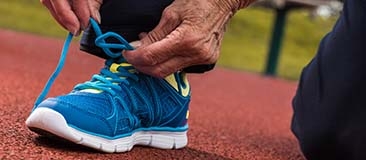Intermittent Fasting Boosts Endurance in Mouse Marathoners

IRP researchers found that abstaining from food every other day increased the endurance of mice that underwent exercise training compared to trained mice that ate every day.
Food companies have long marketed carbohydrate-rich drinks and energy bars to athletes with the message that the energy those snacks provide is key to lifting heavier and running farther. A new mouse study by IRP researchers, however, suggests that skipping a meal (or several) might be far more effective for increasing athletic prowess1.
Unlike modern Americans used to three square meals a day, our ancient ancestors couldn’t exactly throw a TV dinner in the microwave whenever they felt a bit peckish. As a result, they probably found themselves hunting wooly mammoths and fending off saber-toothed tigers on an empty stomach.
“From an evolutionary perspective, animals in the wild – particularly predators – need to be able to function at a high level when they’re in a food-deprived state,” says IRP Senior Investigator Mark P. Mattson, Ph.D., the study’s senior author. “Individuals who were able to perform at a high level in a fasted state had a survival advantage.”
When we fast long enough to use up the carbohydrates stored in our livers, our bodies begin breaking down fat cells into free fatty acids, some of which are used directly for energy and some of which are converted by the liver into another form of fuel called ketones. This process of switching from a carbohydrate-burning state to a fat-burning state is thought to underlie a wide range of health benefits that result from prolonged periods without food. This sort of eating schedule, called intermittent fasting, has been linked to a myriad of physiological benefits ranging from extended lifespans and protection from neurological diseases like Alzheimer’s in animal models to combating diabetes, inflammation, and other ailments in humans2.
“The evidence suggests that ketones are not only an energy source for cells but also have an important signaling function that increases expression of genes involved in cellular stress resistance and the growth and division of mitochondria,” Dr. Mattson says. Since mitochondria supply energy to our cells, it would make sense that prompting the body to produce ketones via fasting might have an effect on athletic training.
In the current study, Dr. Mattson’s team set out to produce the first test of that idea. They divided lab mice into two main groups: a sedentary group and one that underwent two months of daily endurance training. Half of each of those groups had constant access to food, while the other half was only allowed to eat every other day.
As predicted, at the end of the training period, the trained mice that fasted every other day were able to run longer and farther than the trained mice with unlimited access to food, despite the fact that the groups did not differ in their peak oxygen consumption during exercise. What’s more, the fasted mice burned more fats and fewer carbohydrates while running than the freely eating group. Fasting had no effect on endurance in the untrained mice.
“It turns out that muscle cells are more efficient in using fats, so the fasted animals are using the same amount of oxygen but probably generating more energy from the fats,” Dr. Mattson says.
His theory was supported by an analysis of gene activity in a large leg muscle called the soleus, which found that genes involved in cellular stress resistance and the production of energy-producing mitochondria in the soleus muscle were more active in the fasted mice than in their constantly eating counterparts. Moreover, fasting boosted the activity of genes in the liver involved in converting fatty acids into ketones and the blood concentrations of certain small molecules, called metabolites, that are related to that process, reinforcing the idea that the fasted mice were favoring fats over carbohydrates to fuel their cells.
Though the cellular systems underlying the production of energy from fatty acids are similar in mice and humans, similar experiments with human subjects will be needed to confirm the results are applicable to us. Meanwhile, Dimitrios Kapogiannis, M.D., an investigator in Dr. Mattson’s lab, is examining the effect of intermittent fasting on obese older adults with insulin resistance. Dr. Mattson is also planning a collaboration with IRP Senior Investigator Avindra Nath, M.D., to see if that eating schedule reduces the cognitive impairments sometimes seen in HIV patients.
“Given the rapid increase in obesity, diabetes, and other chronic conditions in this country,” Dr. Mattson says, “it would seem prudent to consider the possibility that intermittent fasting could be one approach to improving general health and lowering the risk of a variety of chronic disorders.”
Subscribe to our weekly newsletter to stay up-to-date on the latest developments in the NIH Intramural Research Program.
References:
[1] Metabolic and molecular framework for the enhancement of endurance by intermittent food deprivation. Marosi K, Moehl K, Navas-Enamorado I, Mitchell SJ, Zhang Y, Lehrmann E, Aon MA, Cortassa S, Becker KG, Mattson MP. FASEB J. 2018 Feb 27:fj201701378RR. doi: 10.1096/fj.201701378RR. [Epub ahead of print].
[2] Flipping the Metabolic Switch: Understanding and Applying the Health Benefits of Fasting. Anton SD, Moehl K, Donahoo WT, Marosi K, Lee SA, Mainous AG 3rd, Leeuwenburgh C, Mattson MP. Obesity. 2018 Feb;26(2):254-268. doi: 10.1002/oby.22065. Epub 2017 Oct 31.
Related Blog Posts
This page was last updated on Tuesday, January 30, 2024
